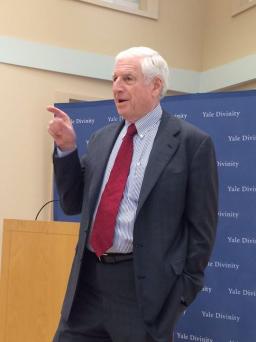A Yale Divinity School graduate, an Episcopal priest, and a veteran of the United States Senate, John Danforth is well credentialed to speak about the intersection of religion and politics.
And speak he did. In appearances at YDS and the Yale Law School law last week, Danforth, ’63 B.D., LL.B., ventured into this sometimes volatile intersection.
Danforth represented Missouri for nearly 20 years in the U.S. Senate. In a conversation with the YDS community, he shared his thoughts about the relationship between religion and politics with candor and conviction. He also criticized his own party, the Republican Party, for what he sees an increasing refusal to compromise for the good of the country.
 At the law school, Danforth appeared alongside Supreme Court Associate Justice Clarence Thomas. The two men are longtime friends.
At the law school, Danforth appeared alongside Supreme Court Associate Justice Clarence Thomas. The two men are longtime friends.
Polarized Politics
YDS Dean Greg Sterling introduced Danforth to a crowd of students, faculty, and staff in Niebuhr Hall Feb. 12. He described Danforth as someone who has stood against the divisive use of “wedge issues” in public life.
Quickly living up to his billing, Danforth spoke directly against what he described as an increasingly polarized political context in which compromise has been dismissed as weakness. By contrast, Danforth highlighted his hope that American churches can play a vital role in restoring the “center” in American politics.
However, the mixture of religion and politics has often been the problem. Danforth didn’t blunt his words on this matter.
“Maybe the strongest, most divisive voice in American politics is people who say God is on my side and against that guy’s side,” Danforth said. “Absolute positions are contrary to the interests of the country and they are idolatrous.”
A Ministry of Reconciliation
Danforth welcomes the involvement of religious people in American politics – after all, he has been simultaneously a priest and a senator. But he laments that religious zeal can have a detrimental impact on the political process.
Instead, he has a different vision for how to bring faith into public service.
“Religious people should be engaged, but not in a way that divides us, but in a constructive way,” he said.
Danforth wants to see divinity schools, scholars, and local congregations involved in this work. He suggested such communities should actively explore how Christians can be “ambassadors of reconciliation” in today’s world.
He highlighted divinity schools as place where “some real depth thinking” can be done about this ministry of reconciliation.
Such depth of thinking is essential to restore today what Danforth believes is essential to the DNA of America.
“One of the projects of the U.S. has been to hold together in one country people with different points of view,” the former senator said.
“He was a model”
Danforth has been an active advocate for the kind of dialogue he wants to see. In 2005 he published a pair of op-eds in the New York Times. These columns, “In the Name of Politics” and “Onward, Moderate Christian Soldiers” decried the increasing influence of a conservative Christian agenda over the Republican Party.
He also wrote a book exploring these same themes, published in 2006, Faith and Politics.
Danforth’s own political career began shortly after he left New Haven with dual degrees in 1963. He was elected attorney general of Missouri at the age of 32 in 1968. In 1976 he was elected to the U.S. Senate and served there until he retired in 1995. He also served for a time as U.S. ambassador to the United Nations under George W. Bush
Danforth’s relationship with Clarence Thomas began early in his career. Thomas, also a Yale Law School graduate, was on Danforth’s staff when Danforth served as attorney general.
At their appearance together at the law school, Thomas described Danforth as someone to emulate.
“He was a model for how I dealt with things, and he is still a model,” the associate justice said.
Win Bassett ’15 M.A.R. also sees Danforth as a potential model for YDS students called to public service. Bassett highlighted Chris Coons, ’92 M.A.R., a Democratic senator from Delaware who recently penned an appreciative account of his time at YDS, as another such figure.
“In our modern secular age, it’s hard to be ‘out’ as religious in public service,” said Bassett, who formerly worked as an assistant district attorney in North Carolina.
To Bassett’s mind, both Danforth and Coons offer examples of public leaders able to humbly articulate how faith affects and motivates their own work.
Herron Gaston ’15 M.Div., ’16 S.T.M. also attended Danforth’s discussion at the divinity school. Gaston, who himself plans to pursue law school, sees religion and politics as an essential point of discussion at the divinity school.
“We are given a biblical mandate to stand on the side of justice,” Gaston said. “That means we are called to serve both the church and the world.”
Caleb Bedillion is a second year M.A.R. student studying religious ethics. After his time at YDS, he plans to continue a career in journalism.